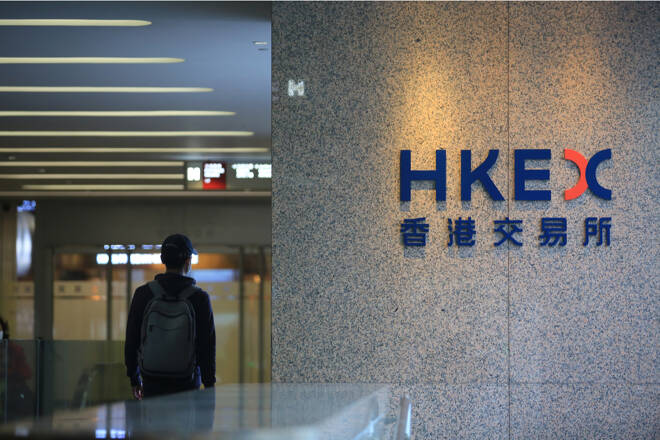Advertisement
Advertisement
Hang Seng, Nikkei Slide Amid US Tariff Threats: HK-Listed Autos Lead the Sell-Off
By:
Key Points:
- US markets plunge as Nvidia tumbles 8.48%, and Trump accelerates tariffs on Canada, Mexico, and China to March 4.
- Hang Seng Index falls 1.45% as tech and auto stocks sink amid US threats of sweeping tariffs on semiconductors, autos, and pharmaceuticals.
- Nikkei 225 slides 2.85% as a stronger Yen and US trade tariffs weigh on Japanese exports, led by tech and auto sector losses.
US Markets: Nvidia Sinks Amid Tariff Threats
US equity markets tumbled on Thursday, February 27, as investors sliced and diced Nvidia’s (NVDA) earnings report and forward guidance.
Adding to market pressure, President Trump accelerated the implementation of 25% levies on Canadian and Mexican imports to March 4 from the previously planned April 2. Additionally, he confirmed 10% tariffs on imports from China. His remarks followed previous threats of 25% tariffs on EU imports and sweeping tariffs on autos, semiconductor chips, and pharmaceuticals.
The Nasdaq Composite Index dropped 2.78%, while the S&P 500 fell 1.59%. Nvidia plummeted 8.48% on February 28, as concerns over weaker-than-expected gross margins overshadowed the positive revenue outlook. Meanwhile, the Dow declined by 0.45%.
Hang Seng Index Falls as Tariffs Loom
In Asia, the Hang Seng Index fell 1.45% on Friday morning after President Trump reaffirmed 10% tariffs on Chinese imports and on the prospects of sweeping 25% tariffs on autos, semiconductor chips, and pharmaceuticals.
The Hang Seng Technology Index slid 2.54%, with Alibaba (9988) and Baidu (9888) down 2.80% and 2.56%, respectively. Auto stocks faced heavier losses, with Li Auto (2015) tumbling 5.24% and Geely Auto (0175) falling 4.43%.
Meanwhile, Mainland China’s equity markets saw relatively modest losses despite the tariff threats. The CSI 300 and the Shanghai Composite Index dropped by 0.50% and 0.54% in the morning session. Hopes for fresh stimulus measures helped cushion the downside as investors anticipated next week’s third session of the 14th NPC.
Nikkei Index Hit By Tariff Jitters and Yen Strength
Japan’s Nikkei Index plunged 2.85% on Friday morning, pressured by a stronger Yen and tariff concerns. The USD/JPY pair fell 0.29% to 149.370. A stronger Japanese Yen, coupled with US levies on Japanese imports, could weigh on demand for Japanese goods and corporate earnings.
Japanese tech stocks Tokyo Electron (8035) and Softbank Group (9984) tracked Nvidia’s losses, sliding 5.10% and 5.31%, respectively. Auto stocks also struggled, with Nissan Motor Corp. (7201) down 2.58%.
ASX 200 Tracks Wall Street Lower
Australia’s ASX 200 Index reversed Thursday’s gains, declining by 0.70% on Friday morning. Gold, mining, and tech stocks outweighed gains in the banking sector.
- Northern Star Resources Ltd (NST) slid by 2.24% after gold prices dropped by 1.35% on February 27 to $2,877.
- Iron ore spot prices fell for the fifth consecutive session on February 27 and extended their losses on February 28 amid fears of a full-blown US-China trade war. Mining giants BHP Group Ltd. (BHP) and Rio Tinto Ltd. (RIO) declined by 1.70% and 2.06%, respectively.
- Meanwhile, falling 10-year US Treasury yields boosted demand for higher-yielding financial stocks.
Outlook: Key Risks and Opportunities
Looking ahead, tariff developments, US inflation trends, and central bank guidance will influence risk sentiment.
While innovation and strategic AI partnerships present growth opportunities, escalating US-China tensions over AI could heighten risk aversion, dampening investor sentiment. Market volatility may persist if uncertainty over US tariff policies continues.
In Asia, rising trade tensions may pressure regional stocks further, while easing concerns could spark a rebound.
Stay ahead of market shifts with expert insights and in-depth analysis here—stay informed and make smarter investment decisions.
About the Author
Bob Masonauthor
With over 28 years of experience in the financial industry, Bob has worked with various global rating agencies and multinational banks. Currently he is covering currencies, commodities, alternative asset classes and global equities, focusing mostly on European and Asian markets.
Advertisement
